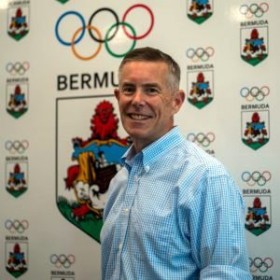New BOA President On Plans, Athletes & More
 [Written by Stephen Wright]
[Written by Stephen Wright]
Peter Dunne has outlined his vision for his three-year term as the president of the Bermuda Olympic Association, insisting his main focus is prioritising the needs of the island’s top athletes.
Dunne succeeded Judy Simons at the helm after she opted not to seek re-election last month.
While Dunne said he aims to build on the solid foundations laid by Simons, he has identified key areas in need of greater clarity and transparency, including the policy regarding universality invitations for the Olympic Games and the allocation of elite athlete funding.
“It’s very daunting,” Dunne told Bernews. “It’s a three-year position because of the current Olympic cycle, and I’m focused on doing the best possible job.
“I was elected as a somewhat reactionary mode, which I recognise. There has been some discontent.
“It’s not about being critical of the past; it’s about where we want to go moving forward.
“One of my main issues is that the BOA has to be athlete-focused, and I’m not saying it wasn’t before.
“I respect the work that Judy did over the years, and I’m not going to pretend I know how to fix everything. I’m looking to stand on the shoulders of the people who came before me.
“I’m looking for a strong transition and to make the organisation grow in service to the athletes.”
The BOA came under scrutiny last summer after rejecting universality places [or wild cards] for swimmers Madelyn Moore and Jesse Washington to compete at the Olympics in Tokyo.
Universality places typically allow smaller nations and those with developing programmes the opportunity to be represented at the Olympics.
As Bermuda had no qualifiers in swimming, they were allowed to enter one male and female athlete in one event; with Moore and Washington receiving invitations from the International Swimming Federation.
Dunne believes it is the role of the BOA to “create as many pathways as possible for our athletes to reach these Games.”
He said: “As an operating practice, the BOA needs to follow and respect the technical knowledge of the National Governing Bodies [NGBs]. This relates to whether we’re sending athletes [to the Games] by accepting universality spots.
“My personal opinion is if the local authority of the sport feels the athlete qualified, the international authority feels the athlete qualified, and the Games will accept them, then we should send them.
“I think that 100 per cent of the members feel that way. Nobody knows track and field better than the Bermuda National Athletics Association, nobody knows boxing better than the Bermuda Boxing Federation, and nobody knows gymnastics better than the Bermuda Gymnastics Association.”
Engaging and communicating with the NGBs is critical, according to Dunne, who wants the BOA’s technical committee to paint a clearer picture of the allocation process for elite athlete funding and provide the NGBs with more assistance in maximising funding opportunities from international organisations.
“We have to have a bit more clarity on the process,” he said. “We want to make it transparent and clear, so athletes understand how to move up [the funding categories] if their career takes them on an upward trajectory.
“A lot of the discontent over the last several years has come from a lack of clarity. Organisations can say, ‘Oh, we have a policy on that,’ but if it isn’t in writing, and it’s affecting someone else, we need to be clear on that.
“The same applies for various funding opportunities, whether it’s Olympic Solidarity or Pan American Sports Organisation funding. There are different channels for that, and all the NGBs must know that.
“The guys handing out the funds want a lot of backup paperwork. We need to help those sporting bodies locally with that process.”
Dunne, who beat first vice-president Brenda Dale to the vacant presidency, said his goal is to have a permanent desk at the BOA office on Pitts Bay Road and adopt a hands-on approach to its day-to-day running.
He will also continue his role as the long-serving president of the Bermuda Bicycle Association.
“My first love is cycling,” said Dunne, who previously served as the second vice-president of the BOA. “I’ve had a fantastic time doing that, and I want to continue doing that.
“My predecessors have all had full-time jobs somewhere, international finance, whatever. Whether I’m chasing down life insurance policies or organising bicycle races on a Sunday, time is time.
“I’ve been a customer on the National Governing Body side of things for many years. It’s given me a window into the BOA, how it interacts with various sporting bodies.”


